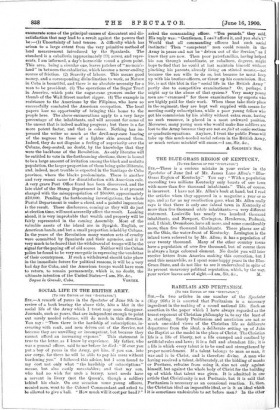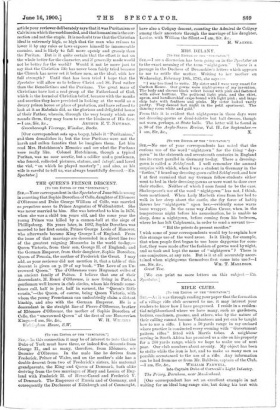RABELAIS AND PURITANISM.
[TO TUE EDITOR OF THE "SPECTATOR."] SIR,—In two articles in one number of the Spectator (May 26th) it is asserted that Puritanism is a necessary ingredient in the making of a sound national life. Such an assertion in the paper which I have always regarded as the truest exponent of Christian philosophy is, to say the least of it, startling. Surely Puritanism and asceticism are not so much one-sided views of the Christian life as deliberate departures from the ideal, a deliberate setting up of John the Baptist as the model in the place of Christ. The Christian life is a life of liberty, not a life cramped and confined by artificial rules and laws; it is a full and abundant life; it is a life is which every talent is to be used and strengthened by proper nourishment. If a talent belongs to man as man, it was and is in Christ, and is therefore divine. A man who having received a talent, deliberately, at the bidding of monks or Puritans, refrains from using it, sins not only against himself, but against the whole body of Christ for the building up of which that talent was given. It is admitted in one article that Christianity is not Puritanic, but it is said that Puritanism is necessary as an occasional reaction. Is, then, the Christian ideal an impossible ideal, or is it an ideal which it is sometimes undesirable to set before men ? In the other
article your reviewer deliberately says that it was Puritanism or Calvinism which the world needed, and that humanism is the cor- rection and not the staple. It is no doubt true that the Christian ideal is extremely high, so high that the man who refuses to lower it by any rules or laws exposes himself to innumerable enemies, and is likely to fall more openly and grossly than the Puritan. But is it quite certain that the effort is not on the whole better for the character, and if generally made would not be better for the world? Would it not be more just to say that the Christian life has never been fairly tried because the Church has never set it before men, as the ideal, with her full strength ? Until that has been tried I hope that the Spectator will allow us to believe Christ and St. Paul rather than the Benedictines and the Puritans. The great mass of Christians have lost a real grasp of the Fatherhood of God, which is the kernel of Christian belief, because with the monks and ascetics they have persisted in looking at the world as a dreary prison house or place of probation, and have refused to look at it as Rabelais did, as the glorious and delightful house of their Father, wherein, through the very beauty which sur- rounds them, they may learn to see the kindness of His face.
[Our correspondent sets up a bogey, labels it "Puritanism," and then demolishes it ; but the true Puritans were not the harsh and sullen fanatics that he imagines them. Let him read Mrs. Hutchinson's Memoirs and see what the Puritans were really like. Colonel Hutchinson, though a typical Puritan, was no sour ascetic, but a soldier and a gentleman, who fenced, collected pictures, statues, and intagli. and loved the viol, "on which he played masterly " ; and also, as his wife is careful to tell us, was always beautifully dressed.—ED. Spectator.]







































 Previous page
Previous page